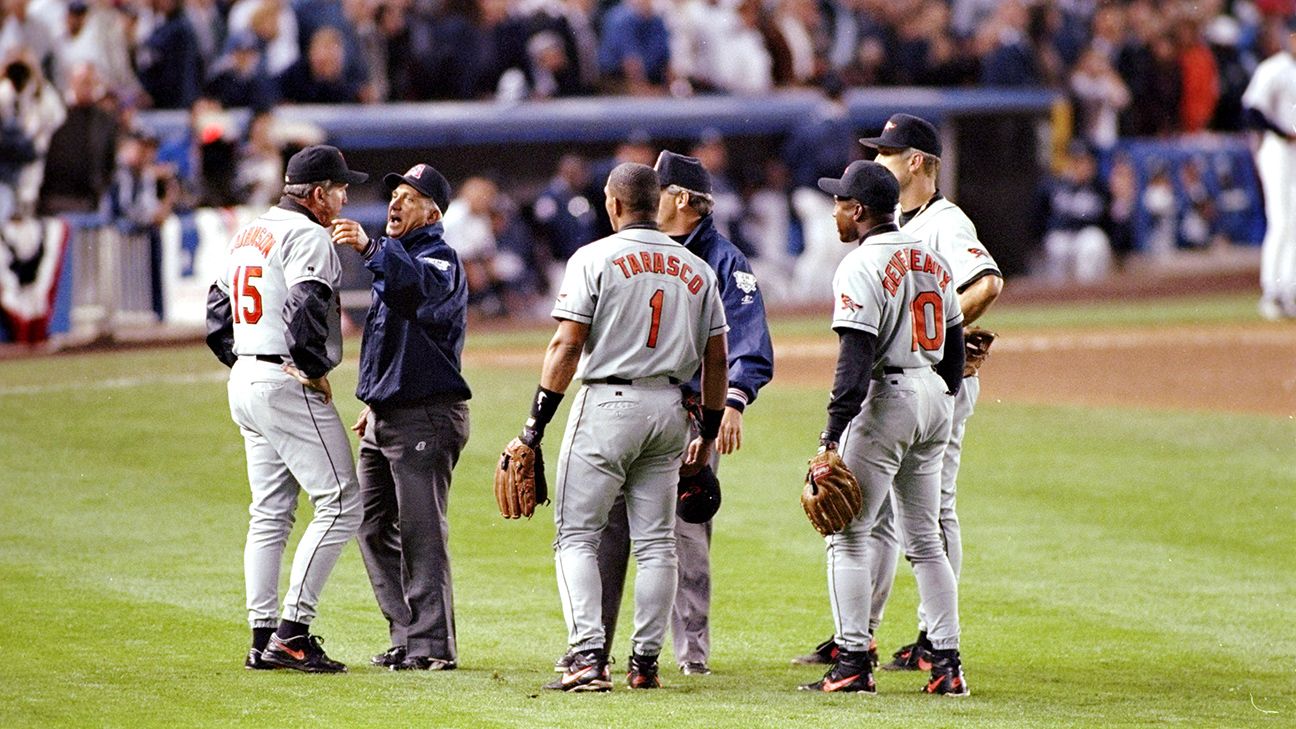
NEW YORK -- Richie Garcia was among baseball's best-rated and most popular umpires, and like many umps was known for the ones he missed: the Jeffrey Maier call in the playoffs, the pitch to Tino Martinez in the World Series.
He lost his job in the failed labor strategy of mass resignations in 1999 and was welcomed back to Major League Baseball two years later as a supervisor. Then, out of nowhere it seemed, he was fired on the eve of the 2010 season.
Garcia stayed quiet for a decade, not wanting to cause any problems for son-in-law Vic Carapazza, among the top umps of the current group.
Now, at 77, Garcia is fed up. He is feeling impugned by a former colleague in a lawsuit Garcia has nothing to do with.
"I worked too hard to keep a good reputation in baseball for these people to just come out and say whatever the hell they want, to just say things just out of the clear blue sky," Garcia said during a series of interviews in the past month with The Associated Press.
"I've kept my mouth shut all these years because of my son-in-law. I kept my mouth shut because I'm protecting him and my daughter. And I'm just sick of it," he said.
A big league umpire from 1975 to 1999 and a supervisor for nine years, Garcia was abruptly dismissed. The commissioner's office announced his departure two days before Opening Day. No reason was given.
Garcia never tried to explain.
Then last month, a May 2019 deposition by umpire supervisor Randy Marsh was publicly filed by lawyers for umpire Angel Hernandez, who sued MLB for race discrimination. Marsh alleged Garcia was fired because he attended minor league games involving Carapazza, who worked his first big league game seven days after Garcia's departure was announced.
"His son-in-law was umpiring in the minor leagues, was in strong consideration for promotion to the major leagues, and he was told not to go watch him work, because of being related to him," Marsh testified. "He continued to do so. He had been told not to do it, and he continued to do it."
Marsh told the AP in a telephone interview on Monday that he spoke incorrectly during his deposition and he wanted to set the public record straight.
"I had no idea what reasoning they gave him for being fired and had heard from working with Rich Rieker -- who was a supervisor during all those times -- was that at one point he was told not to go watch his son-in-law umpire," Marsh said. "I probably misworded it when I was deposed. It shouldn't come out like that."
Garcia attributed his firing to Rob Manfred, then MLB's executive vice president for labor relations and now commissioner, and Jimmie Lee Solomon, then executive vice president of baseball operations. Garcia was let go along with fellow supervisors Marty Springstead and Jim McKean, and they were replaced by Marsh and Charlie Reliford.
MLB declined comment on behalf of Rieker and Manfred, who succeeded Bud Selig as commissioner in 2015.
"Nobody had it in for anybody," said Solomon, who left MLB in 2010. "But there was a desire, a general desire, to upgrade our situation a little bit. The old-school ways we felt were going to end up biting us, and we needed to get some new blood in."
Garcia said his relationship with Manfred became strained when he allowed his photo to be used by ESO, a company launched by former vice president of umpires Ralph Nelson. Garcia said Solomon was upset over Garcia's decision to terminate a minor league umpire, which Solomon denied.
After reading Marsh's testimony, Garcia was concerned the allegation might harm Carapazza, who is married to Garcia's daughter Stephanie.
"I wanted to clear his ability to be a big league umpire and not have people think he got there because of me," Garcia said.
Garcia, now living in Clearwater, Florida, worked four World Series and was behind the plate for Len Barker's perfect game in 1981.
He still is criticized for two postseason decisions. He didn't call fan interference on the 12-year-old Maier and allowed Derek Jeter's home run over Baltimore Orioles right fielder Tony Tarasco in the 1996 American League Championship Series opener.
In Game 1 of the 1998 World Series at Yankee Stadium, Garcia called a ball on a 2-2 pitch by San Diego Padres lefty Mark Langston that appeared to be in the strike zone. Martinez hit the next pitch for a tiebreaking grand slam.
Garcia got a glowing year-end appraisal from then-supervisor Mike Port in 2008; Garcia said it was the last one he received. "Consistently exceeds goals and competencies," it read, according to a copy obtained by the AP.
Joe West, head of the umpires' union at the time of the firing, backed Garcia's account.
"'I don't want to be in a situation where I have a conflict of interest because he's my son-in-law,'" West recalled Garcia explaining. "And then he said: 'I'm just not going to write a report on him.'"















 Phone: (800) 737. 6040
Phone: (800) 737. 6040 Fax: (800) 825 5558
Fax: (800) 825 5558 Website:
Website:  Email:
Email: 






